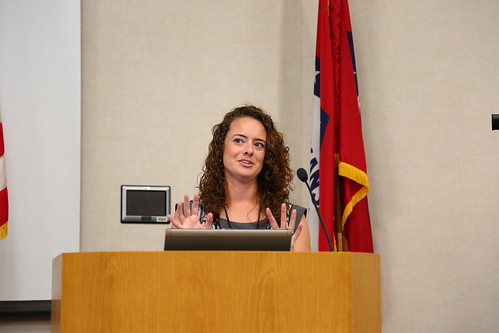Iowa community developer speaks at Breakthrough Solutions Conference
By Sarah Cato
U of A System Division of Agriculture
June 15, 2018
Fast facts:
- Breakthrough Solutions Conference hosts Liesl Voges
- Take away points include inclusion, collaboration and vision
(530 words)
(Photos available at https://flic.kr/s/aHsmmcoPvq)
(Download this story in MS Word format here.)
LITTLE ROCK – Breakthrough Solutions, a partnership program of the University of Arkansas System Division of Agriculture’s Community and Economic Development unit, is offering answers to Arkansas communities concerned about dwindling populations.
Breakthrough Solutions assists in creating a path to success to bring vibrancy and sustainability to Arkansas communities.
The program and its partners hosted its annual conference June 7 to educate community leaders on the importance of focusing on opportunities in communities. Keynote speaker Liesl Voges, Community Development Manager at the Iowa Arts Council and director of the Iowa Great Places program, spoke on “Great Places Create Great Opportunities.”
Voges spoke about the importance of great places – communities that have a unique sense of place, engaging experiences, a rich social fabric, a creative economy, and pleasing environment.
Voges also spoke about the importance of building a strong, diverse economy within communities.
“If you have a diverse economy it makes all the difference in the world,” she said. “You want to encourage those new entrepreneurs.”
But to encourage a diverse economy and newcomers, you first have to create a desirable atmosphere for businesses and entrepreneurship.
“A variety of assets is very important, like housing opportunities, parks, pools, trails, and incentives for entrepreneurs,” Voges said. “Even little things like clean streets and sidewalks make a huge difference.”
Choosing which assets to invest in is a decision for the people. Voges stressed the importance of a collective, collaborative community vision.
“Creating a community vision is a process and a product. You’re developing a consensus to better understand the core values of your community,” she said. “After the vision process, the community gets excited. It really helps the process move forward.”
Developing a community is an on-going, never-ending process, so it’s important not to get too wrapped up in the big picture, but enjoy as each piece of the puzzle comes together.
“Have a time line planned out with evaluations,” Voges said, “but make sure you celebrate every success you have.”
Mark Peterson, Professor of Community and Economic Development, said that Voges’s take on encouraging a strong economy by creating a thriving community was one that Arkansas communities could benefit from.
“She did a great job of helping us understand that in the 21st century economy, quality of place has emerged as a major economic driver,” Peterson said. “Because without a high quality of place, it is hard to attract a skilled work force, and without a skilled work force, it is hard to create or attract jobs. She inspired us all to work hard to create even more great places in Arkansas.”
Peterson said that the conference had a great turn out and promising feedback.
“We were delighted with the response and participation of community leaders from across the state in our Breakthrough Solutions Conference,” he said. “I think the fact that two-thirds of Arkansas counties lost population from the last census population estimate has motivated many community and county leaders to seek answers and solutions that will lead them to a vibrant and viable future.”
To learn about the Breakthrough Solutions visit www.uaex.uada.edu/breakthrough-solutions, or contact Dr. Mark Peterson at mpeterson@uada.edu.
About the Division of Agriculture
The University of Arkansas System Division of Agriculture’s mission is to strengthen agriculture, communities, and families by connecting trusted research to the adoption of best practices. Through the Agricultural Experiment Station and the Cooperative Extension Service, the Division of Agriculture conducts research and extension work within the nation’s historic land grant education system.
The Division of Agriculture is one of 20 entities within the University of Arkansas System. It has offices in all 75 counties in Arkansas and faculty on five system campuses.
Pursuant to 7 CFR § 15.3, the University of Arkansas System Division of Agriculture offers all its Extension and Research programs and services (including employment) without regard to race, color, sex, national origin, religion, age, disability, marital or veteran status, genetic information, sexual preference, pregnancy or any other legally protected status, and is an equal opportunity institution.
# # #
Media Contact: Ryan McGeeney
Communication Services
U of A System Division of Agriculture
Cooperative Extension Service
(501) 671-2120
rmcgeeney@uada.edu
